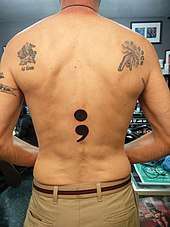Project Semicolon
 | |
| Founded | 2013 |
|---|---|
| Founder | Amy Bleuel |
| Type | 501(c)(3) |
| Focus | Achieving lower suicide rates in the U.S. and around the world |
| Location | |
| Origins | Founded in 2013, ten years after the death of Amy Bleuel's father by suicide. |
Area served | Worldwide |
| Method | Mental health advocacy |
| Website | projectsemicolon.org |
Project Semicolon - stylized as Project ; - is an American mental health nonprofit organization that primarily functions as an anti-suicide initiative. Founded in 2013, the movement is aimed to "presenting hope and love to those who are struggling with depression, suicide, addiction, and self-injury".[1] They have been known for encouraging people to tattoo the punctuation mark semicolon (;) onto their bodies as a form of solidarity between people dealing with mental illness or death of someone from suicide.[2]
History
Project Semicolon was founded by Amy Bleuel in 2013, as a tribute to her father, who died by suicide in 2003.[3] She was a Christian.[4][5]
Amy Bleuel
Bleuel lived in Wisconsin. After her parents divorced, Bleuel chose to live with her father and his second wife at the age of 6. Since then, Bleuel endured being physically abused by her stepmother. At the age of 8, she was taken into state custody by a child protective service. Bleuel began self-harming and attempting to kill herself after she had been sexually abused at the age of 10,[4] and raped at 13. At the age of 18, Bleuel's father died from suicide, and she was subsequently released from the system.[6] In her early years in college, Bleuel was raped twice and suffered a miscarriage.[6] Bleuel suffered from alcoholism at the age of 30 and had five major suicidal attempts.[4]
Bleuel died on March 23, 2017, aged 31; the cause of death was ruled as suicide. She was romantically involved with her partner David.[7]
Overview
Project Semicolon defines itself as "dedicated to presenting hope and love for those who are struggling with mental illness, suicide, addiction and self-injury", and "exists to encourage, love and inspire".[1] While they are devoted to achieving lower suicide rates in the U.S. and worldwide, they do not themselves practice psychiatry, and the staff are not trained mental health professionals.[5] Rather, they recommend contacting emergency hotlines (e.g. 9-1-1 or the National Suicide Prevention Lifeline) or seeking mental health professionals.[8] The movement is inclusive for people holding different beliefs or religions.[9][4][5]
Advocacy

Project Semicolon explains that "a semicolon is used when an author could've chosen to end their sentence, but chose not to. The author is you and the sentence is your life".[1]
The movement became prominent in early July 2015. People have started uploading photos of their own semicolon tattoos through social media to support the movement, gaining attention from a variety of mainstream news outlets.[2][9][10]
Amy Bleuel remarked on the initial outcome of the 2016 U.S. presidential election, crisis hotlines having reported a major uptick, that "There's valid fear and fear drives suicide. Also, sadness drives suicide. So these people are feeling this and it's at an overwhelming extent that they're choosing to go that route."[11]
A book titled Project Semicolon: Your Story Isn't Over was released on September 5, 2017. Published by HarperCollins, it is a compilation of stories and photos shared within Project Semicolon's online community.[12]
Support
Project Semicolon was echoed when actress Selena Gomez tattooed a semicolon onto her wrist to commemorate the premiere of 13 Reasons Why, a Netflix series in which she served as co-executive producer. Accordingly, the show's casts Alisha Boe and Tommy Dorfman have also tattooed the punctuation mark onto their wrists in commemoration of the suicide-themed drama series released in early April 2017.[13]
See also
References
- 1 2 3 McDonald, Tim (May 6, 2016). "You Are #NotAlone". The Huffington Post. Retrieved April 12, 2017.
- 1 2 Grisham, Lori (July 9, 2015). "Semicolon tattoos raise awareness about mental illness". USA Today. Retrieved October 18, 2016.
- ↑ "Project Semicolon — Our Founder". projectsemicolon.org. Archived from the original on October 13, 2016. Retrieved October 18, 2016.
- 1 2 3 4 Rollins, Mark (June 27, 2016). "Interview with Amy Bleuel, Founder of Project Semicolon, and How to Fight Depression, Addiction, Suicide, and Self-Injury". The Gospel Herald. Retrieved October 18, 2016.
- 1 2 3 Reinis, Samantha (July 9, 2015). "The Moving Meaning Behind the Viral Semicolon Tattoo". The Daily Signal. Retrieved October 19, 2016.
- 1 2 "Why Me God? Why My Testimony? - A Story of Hope in The Midst of Despair". projectsemicolon.org. Archived from the original on September 18, 2015. Retrieved October 18, 2016.
- ↑ Blair, Nolan (March 30, 2017). "Project Semicolon founder dies". WBAY-TV. Retrieved April 3, 2017.
- ↑ "Project Semicolon — Our History". projectsemicolon.org. Retrieved October 19, 2016.
- 1 2 Steyer, Carly (July 7, 2015). "Global Semicolon Tattoo Trend Is A Sign Of Strength Among Faithful Individuals Dealing With Mental Health Problems". HuffPost. Retrieved October 18, 2016.
- ↑ Bolton, Doug (July 4, 2015). "People all over the world are getting semicolon tattoos to draw attention to mental health". The Independent. Retrieved October 19, 2016.
- ↑ Matesic, Emily (November 10, 2016). "Presidential politics leading some to seek mental health help". wbay.com. Archived from the original on November 12, 2016. Retrieved November 16, 2016.
- ↑ "Project Semicolon's verified Facebook page". Facebook. February 14, 2017. Retrieved February 18, 2017.
- ↑ Desantis, Rachel (April 10, 2017). "13 Reasons Why cast gets semicolon tattoos to symbolize suicide prevention". New York Daily News. Retrieved April 12, 2017.